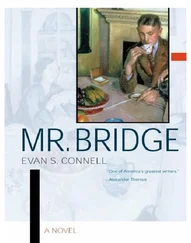“Do you know what he did afterward, Mother? He tried to make it up the way men always do.”
“Carolyn, there are some things about marriage that a woman has to “
“Oh, no, don’t tell me that! I don’t want any part of that myth I don’t! Why, Mother, he didn’t even know it was me. Do you know what I’m saying?”
“Why don’t you tell me how it all started?” she replied, pulling the robe more tightly around her throat.
“It started at breakfast because I’d forgotten to get butter the day before, so he got sarcastic, and then he decided I didn’t know how to feed the baby, and then he began yelling when he couldn’t find his blue suit. Mother, he’s been hounding me about that suit for two weeks. It’s been at the cleaners and I’ve been so rushed with the baby and with the qualifying rounds at the club that I haven’t had time to pick it up. He could have picked it up himself because he comes right by the cleaners every day, but he keeps saying that’s my job. So, anyway, next he began shouting at me that if I spent less time playing golf and more oh, hell, what’s the use? I mean, anyway, after he finally went to work I thought maybe it was partly my fault and so in order to make it up to him I got a baby-sitter to come over while I went to the beauty shop to have my hair set, and they couldn’t take me right away and by the time I finally got through it was late and I didn’t get home till after he did because I had to pay some bills and stop at the club to see if my entry had been posted. Well, I guess you can imagine what a foul temper he was in when his dinner wasn’t ready for him, and he’d called the club and they’d told him I was there, even after I’d given strict orders to say I wasn’t. Well,” she went on, after drawing a deep breath, “he was furious and swearing. He’d thrown clothes all over the bedroom and even jerked out some of the drawers and turned them over on the bed because he couldn’t find what he wanted. I told him the stuff hadn’t been washed and he knew perfectly well the washing machine was broken. I guess he expected me to hand-wash everything. I mean, really, Mother, that’s what he expected.”
“Well, I don’t think it would hurt you to do some washing/’
“Oh, Mother, honestly! All he has to do is get the machine fixed.”
“Yes, I understand, dear, but perhaps if both of you were to try a little harder “
“He said I didn’t have the faintest idea what it meant to have to work.”
“Why, that’s absurd!”
“He said I was spoiled, Mother. Is that the truth?”
“Of course not, dear. Why should he say a thing like that? Now I’m sure everything is going to work out all right, so why don’t you get some rest? You’ll feel better in the morning/’
“And do you know whose fault he said it was, Mother?*’
Mrs. Bridge was caught between wanting Carolyn home again for good, and wanting the marriage to succeed. The world was reeling, so it seemed, and she lost faith in tomorrow. Her ears rang with the frenetic song of war. She could not understand the slaughter and she was often frightened now that Douglas was gone. He had persuaded his father to let him join the Army before the draft caught up with him and now he was somewhere in Arizona. He wrote to her every week cheerful, airy letters, as though he had gone camping for the summer and would be back in time for college, and she could almost believe this was true. Then, without warning, she would be struck by the actual truth and she would feel lonely and helpless, and guilty over the happiness she experienced whenever Carolyn appeared. With Carolyn in the house even in a foul humor so that she smoked and cursed without regard for any-one else even then Mrs. Bridge was comforted, for her presence was an arch to the past, and Mrs. Bridge never tired of dreaming of the days when the children were small, and there had been peace, and so much to anticipate.
Often she sat up with a start, and after a desperate glance at the clock she would be ashamed to learn that two or three hours had gone by while she was thinking. She had given up working at the charity center; there were more than enough volunteers, particularly among the younger women, and the staring eyes of the people on Ninth Street had begun to haunt her. She often saw them in the middle of the night, the hungry, lost people.
And she was haunted, too, by recollections as inanimate and soulless as these unfortunate people, which surrounded her with undemanding, relentless attention, like a perfect cir-cle of question marks incidents, for the most part, comments she had offered, replies, attitudes, trivial circumstances which by all logic should have long since passed into obscurity, but which recurred persistently to trouble her. And always, or very nearly so, she overcame these doubts; and yet, even as she arose, secure in her convictions, she was aware she had not triumphed over them, nor destroyed them, nor pacified them, but only pushed them away for a little while, like nagging children.
Douglas came home on furlough; he got out of the taxicab looking much older. There was another soldier in the taxi to whom he waved good-by, and Mrs. Bridge, waiting to em-brace her son, heard him call in a resounding voice, ”Save a Jap for me, sergeant!”
“Who was that?” she asked.
“Fellow I met on the train,” he replied briefly.
“Didn’t you want to ask him in?”
“I did, but he’s on his way,” Douglas said, and throwing his duffel bag across one shoulder he pushed open the door and strode into the house.
“You’ve gained some weight,” she said, and she noticed, too, that he stood erect now, and there was a frankly adult look in his eyes. The most remarkable change, however, was the fact that he was beginning to grow a mustache a reddish burr looking somewhat like a patch of sandpaper. Mrs. Bridge thought it looked very silly, and not wanting to hurt his feelings she avoided mentioning it.
Mr. Bridge, however, was neither reticent nor considerate of Douglas’s feelings.
“For the love of Mike, what’s that?” he asked, on first catching sight of the new mustache, but Douglas, very much to the surprise of his mother, neither flushed in embarrassment nor dropped his eyes.
“You think you could do any better?” he solemnly replied.
Mr. Bridge laughed and clapped him solidly on the shoulder. “How about a drink before dinner, soldier?”
“I could use one,” said Douglas, and away they went to the kitchen. Mrs. Bridge heard them laughing, and Harriet’s shrill laughter joining in.
Although she could not understand her son she was so pleased to have him home that she continually found excuses to be near him. So it was that she knocked on his door to ask if his socks needed mending. He told her to come in and look. She entered and found him standing in front of the bathroom mirror lathering his jaw. He was not wearing a shirt, only an olive green undershirt and khaki trousers, and she noticed a metal chain around his neck that he had never worn before.
“What on earth is this?” she inquired, approaching hesitantly, full of love and tenderness.
“Dog tags,” he said. He was amused.
She drew the chain up from beneath the undershirt, strangely and deeply moved to discover there was hair on his chest, and she held the tags in trembling fingers. She inquired about the data stamped on the dull brass disks, and he told her that one was his serial number, another his blood type, and so on.
“What is this T’?” she wanted to know.
“Protestant,” he said. “I told them I was a Buddhist, but they insisted I was a Protestant.”
“You did what?”
“We have to fill out forms all the time. Every form has a blank where you write down your religious affiliation. I al-ways write Buddhist, but somebody always types it up Protestant. I don’t know why.”
Читать дальше












